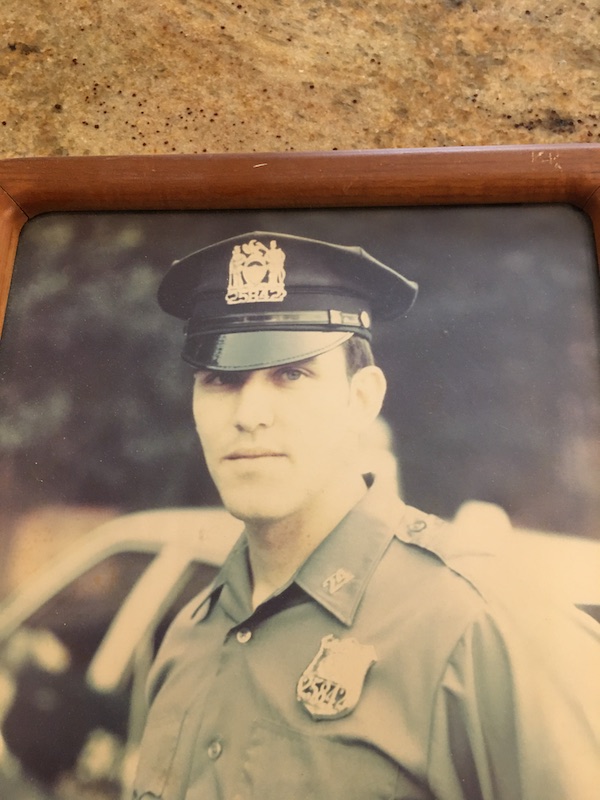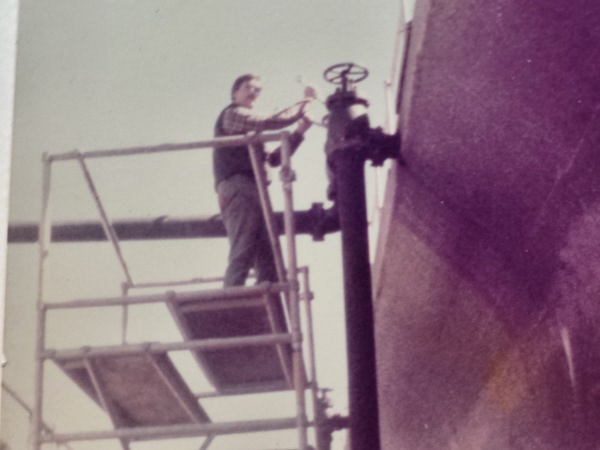
Editor’s Note: This is the first article in the Tablet’s series “Before They Were Priests,” a look at the interesting and diverse professions priests held before they answered God’s call to the priesthood.
FLUSHING — Long before he served Mass at St. Kevin’s Church, Father Jeffry Dillon served the public in a different way — as a New York City police officer. This was back in the 1970s, a volatile time in the city’s history, and he patrolled the streets of the Upper West Side as a police officer assigned to the 24th Precinct.
“There were a lot of riots in the city. We were doing a lot of crowd control,” recalled Father Dillon, who is now an associate in residence at St. Kevin’s in Flushing.
Father Dillon, who eventually left the NYPD and was ordained a priest in 1981, is one of several clergy members in the Diocese of Brooklyn who came to the priesthood after working in other professions.
Father Bryan Carney, for example, who is now a chaplain at Flushing Hospital Medical Center, served in the military and worked as a steamfitter.
Father Dillon graduated from Nazareth Regional High School in 1967 at the age of 17 knowing that he wanted to be a cop, but he was too young to enter the police academy. “So I worked in the 79th Precinct doing typing for them,” he remembered. He had learned how to type at Nazareth.
He got the job at the 79th Precinct through a special police trainee program of the NYPD. In addition to typing up reports on an old manual typewriter, he learned how to fingerprint people who were applying for gun permits. It was a skill “which came in handy later on,” he said, when he had to fingerprint arrested suspects.
At the age of 21, Father Dlllon entered the police academy. Upon earning his badge, he was assigned to the 24th Precinct. New York City was a powder keg at that time. “There was terrorism. The Weather Underground was trying to blow up the Statue of Liberty. There was the Black Liberation Army. There was a lot of violence. There were riots and demonstrations at Columbia University,” he said.
“At times, it was scary,” he admitted. “There were police shootings. It was a period of time when uniformed officer radio cars were followed by an unmarked [police] car because of snipers shooting at police officers.”
Father Dillon patrolled the streets, answering radio calls from members of the public seeking help in emergencies.
He recalled how he arrested a murder suspect who had stabbed his companion in the chest.
“There wasn’t much investigation [needed] to make the arrest. We made it right there at the scene because before he died, the man who had been stabbed gave a dying declaration. With a dying declaration, you can make an arrest. The suspect was there. We took him into custody without incident,” he recalled.
What kept Father Dillon going through the tough times? Two words: commitment and faith.
“My colleagues had a commitment to the work that I felt, too. I’ve always found that police officers wanted to make a positive impact on the lives of people in the city. And I think having faith is a part of that. A lot of police officers were religious. They saw the presence of God. They saw themselves as instruments of God,” he explained.
Father Bryan Carney not only has a long and distinguished record of military service, but he also worked as a steamfitter at the World Trade Center for a time.
His military service started in 1966 when the Vietnam War was raging. “I joined the Air Force and volunteered for Vietnam at 17. I went in the Air Force, did my four years, and got out. And then I went back in many years later when [Operation] Desert Storm broke out,” he recalled.
When his first enlistment was up in 1970, he returned home to New York with two possible career paths ahead of him. “I wasn’t sure what I wanted to do at that stage. I was going to join the Police Department. I took the test. But I didn’t join when my name came up,” he said.
Father Carney had a good reason for his reticence. “I actually had a tryout with the Mets as a pitcher,” he explained.
Major League Baseball wasn’t in his future, however. He decided to rejoin the NYPD’s waiting list. “Then, while I was limping around waiting for the cops to call me for the next class, I was bartending. And a guy came in and told me that the steamfitters were hiring. So I went down there,” he recalled, adding that union jobs were opening up because of a federal lawsuit.

“I didn’t even know what a steamfitter did,” he admitted. Steamfitters lay out, maintain, and repair piping systems carrying water or steam.
“I took the test and then the interview and I got accepted as an apprentice,” Father Carney recalled. He was 25 years old when he began a five-year apprenticeship program. “And I was very happy. I was working when no one else was working in the early ’70s. It was very, very hard to find work back then,” he remembered.
At that time, New York City had plunged into a fiscal crisis that nearly caused the city to declare bankruptcy. Cops and teachers faced layoffs and city services were severely curtailed.
It made Father Carney realize that God works in mysterious ways. “I was on the list for the Police Department. Now we are in a financial crisis. And they laid off cops. So I stayed with the steamfitters. I stayed there for 33 years. It was just the way things turned out,” he said.
As a steamfitter, Father Carney worked on numerous buildings, including the World Trade Center. “Funny enough, I worked on virtually every one of those buildings that came down in the [Sept. 11] attack,” he recalled.
In 1991, when Operation Desert Storm was underway, he rejoined the Air Force. “They were looking for guys who had served in the military before to come back. If you could pass the physical and you worked in certain career fields, you could join. And one of the career fields was mine. So all I had to do was go down and take the physical. I got in and I was stationed in Newburgh upstate,” he explained.
After the war, he went into the Air Force Reserves and worked as a steamfitter on weekends. “I met a chaplain along the way and I went to confession. And he took me under his wing,” he recalled. At the age of 58, Father Carney was ordained a priest in the diocese.
